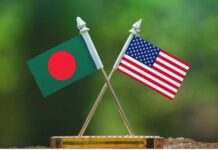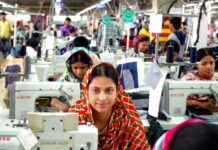Planning ministry report says

Bangladesh will face an uphill task in convincing major trading partners and regional blocs to sign free trade agreements (FTAs) because of higher tariffs as it looks to retain duty benefits after its graduation from the LDC group, according to a government report.
“With its sky-high tariff regime relative to its comparators, Bangladesh will face a major hurdle in getting prospective FTA suitors to come calling.”
The General Economics Division, a wing under the planning ministry, prepared the report styled “Impact assessment and coping up strategies of graduation from LDC status for Bangladesh”.
Currently, Bangladesh does not have any bilateral FTA with any country. Dhaka has been in talks with many countries for years to sign FTAs and the Comprehensive Economic Partnership Agreement (Cepa).
In December, Bangladesh struck preferential trade agreement (PTA) with Bhutan, its first bilateral trade agreement, as it looks to retain duty-free market access after it becomes a developing nation in 2024.
Bangladesh may ink PTA with Nepal soon. Besides, the government is in negotiation with 11 more countries to sign FTAs.
Regional trading arrangements that hold tremendous potential for trade and investment are the Regional Comprehensive Economic Partnership (RCEP), the Association of South East Asian Nations (Asean), and the Comprehensive and Progressive Agreement for Trans-Pacific Partnership, which together will constitute the bulk of Asian market in the future.
Bangladesh would be well-advised to reach trading arrangements with these groupings, the report said.
“But that could be an uphill task given the current high tariff regime in Bangladesh and the enormous resistance from domestic import substitution industries to any reduction of protective tariffs.”
As an LDC, Bangladesh has mostly enjoyed preferences that are unilaterally granted by trading partners.
This might have discouraged more proactive market exploration initiatives through bilateral and regional trade deals that would have required exchange of trade concessions based on reciprocity.
Post-LDC, Bangladesh may have to negotiate a trading arrangement with the EU and the post-Brexit United Kingdom to ensure favourable access to the markets, which account for more than 60 per cent of exports from the country.
Beyond that, Bangladesh may seek more bilateral or regional FTAs if the projected trade creation (trade growth) contributes to growth and employment creation.
Bangladesh is a significant beneficiary of the multilateral trading system and its special exemption for LDCs and developing countries.
“It would be in the best interests of Bangladesh to continue to be a strong participant under this global system of compliance of trade rules even after graduation,” the report said.
Of late, the multilateral trade regime has come under severe strain from the rise in economic nationalism and protectionism. Consequently, a growing number of nations, both developed and developing, are seeking to sign FTAs on a regional or bilateral basis.
An FTA has the potential to create access to larger markets for Bangladesh’s exports. But they have advantages and disadvantages.
On the plus side, an FTA can force local industries to improve competitively and rely less on government subsidies. The arrangements can open new markets, expand the gross domestic product (GDP), and invite new investments.
They also allow companies to discover new technologies and better ways of doing things. FTAs could trigger a beneficial process of competitive liberalisation, according to the study.
A deeper, broader and rapid liberalisation under an FTA produces a bigger effect. The FTA impact will be greater if the impediments to trade removed by the trading arrangement are large relative to those that remain untouched, the report said.
The most fundamental factor is the capacity of the economy to increase the supply of products for which the FTA has boosted demand.
Any contribution of an FTA to Bangladesh’s economic development is likely to be influenced heavily by the broader policy stance of the government, the flexibility of the economy and the extent to which supply can respond to any new demand.
“We could target FTAs with the countries that have already shown interest, such as Malaysia, China, India and Thailand,” the report said.
Emerging market economies would also be good candidates, apart from Organisation for Economic Co-operation and Development (OECD) member countries. “The point to note is that gains from any FTA will be minimal if the market size of the partner country is small.”
In addition to export policies, a set of other complementary policies and programmes are required to promote exports after graduation from the LDC group, according to the report.
They include a stable macroeconomic environment, the effectiveness of the export promoting and supporting institutions, and smooth functioning of the financial markets.
Furthermore, the quality of governance should be improved by promoting transparency and accountability and reducing corruption.
“The government should also take effective role in technology diffusion and providing appropriate physical infrastructural facilities.”
The report suggested developing intense negotiation capacity as the next decade will be crucial for strengthening economic institutions that will help entrepreneurs seize market opportunities emerging in a fast-changing global economy.
Bangladesh must close the huge gap that exists in trade-related capacities in the key ministries and agencies responsible for formulating and carrying out trade policies, and mainstreaming them as essential components of growth and poverty reduction national policies.
Bangladesh has serious capacity constraints in preparing and developing negotiation strategies and undertaking actual negotiations, the report said.
“That makes it absolutely critical that Bangladesh prepares for bilaterally or regionally-negotiated trade deals to address some of the challenges arising from its LDC graduation.”
It said Bangladesh needs to build and nurture inclusive economic institutions that are effective in enforcing property rights, create a level-playing field for small and large entrepreneurs, encourage investment in innovation, adopt new technologies and develop skills for the future to attain and sustain high economic growth.
The commerce ministry is the lead ministry in the preparation of technical inputs for trade policy-making and negotiations.
Other ministries and departments such as the Bangladesh Trade and Tariff Commission, the National Board of Revenue, the foreign and labour ministries and the private sector should coordinate with the commerce ministry to sign the FTAs, the report added.









